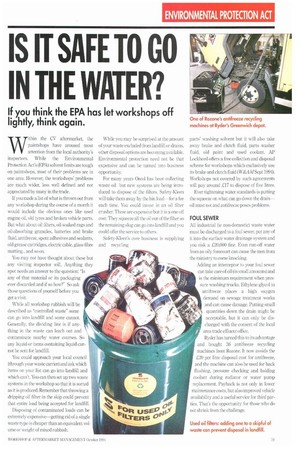IS IT SAFE TO GO IN THE WATER?
Page 115

If you've noticed an error in this article please click here to report it so we can fix it.
If you think the EPA has let workshops off
lightly, think again.
Within the CV aftermarket, the paintshops have aroused most attention from the local authority's inspectors. While the Environmental Protection Act's (EPA) solvent limits are tough on paintshops, most of their problems are in one area. However, the workshops' problems are much wider, less well defined and not appreciated by many in the trade.
If you made a list of what is thrown out from any workshop during the course of a month it would include the obvious ones like used engine oil, old tyres and broken vehicle parts. But what about oil filters, oil-soaked rags and oil-absorbing granules, batteries and brake fluid, antifreeze, spent adhesives and sealants, old grease cartridges, electric cable, glass fibre matting... and so on.
You may not have thought about these but any visiting inspector will. Anything they spot needs an answer to the question: "Is any of that material or its packaging ever discarded and if so how?" So ask those questions of yourself before you get a visit.
While all workshop rubbish will be described as "controlled waste" some can go into landfill and some =not. Generally, the dividing line is if anything in the waste can leach out and contaminate nearby water courses. So any liquid or items containing liquid cannot be sent for landfill.
You could approach your local council (through your waste carrier) and ask which items on your list can go into landfill and which can't. You can then set up two waste systems in the workshop so that it is sorted as it is produced. Remember that throwing a dripping oil filter in the skip could prevent that entire load being accepted for landfill.
Disposing of contaminated loads can be extremely expensive—getting rid of a single waste type is cheaper than an equivalent volume or weight of mixed rubbish, While you may be surprised at the amount of your waste excluded from landfill or drains, other disposal options are becoming available. Environmental protection need not be that expensive and can be turned into business Opportunity.
For many years Orcol has been collecting waste oil but new systems are being introduced to dispose of the filters. Safety-K leen will take them away by the bin load---fora fee each time. You could invest in an oil filter crusher. These are expensive but it is a one-off cost. They squeeze all the oil out of the filter so the remaining slug can go into landfill and you could offer the service to others.
Safety-Kleen's core business is supplying and recycling parts' washing solvent but it will also take away brake and clutch fluid, parts washer fluid, old paint and used coolant. AP Lockheed offers a free collection and disposal scheme for workshops which exclusively use its brake and clutch fluid (W&AMSept 1994). Workshops not covered by such agreements will pay around £17 to dispose of Eve litres.
Ever tightening water standards is putting the squeeze on what can go down the drain— oil must not and antifreeze poses problems.
FOUL SEWER All industrial (ie non-domestic) waste water must be discharged to a foul sewer, put any of it into the surface water drainage system and you risk a £20,000 fine. Even run-off water from an oily forecourt can cause the men from the ministry to come knocking.
Adding an interceptor to your foul sewer can take care of oil (in small amounts) and is the minimum requirement when pressure washing trucks. Ethylene glycol in antifreeze places a high oxygen demand on sewage treatment works and can cause damage. Putting small quantities down the drain might he acceptable, but it can only be discharged with the consent of the local area trade effluent office.
Ryder has turned this to its advantage and bought 36 antifreeze recycling machines from Rozone. It now avoids the ,C20 per litre disposal cost for antifreeze, and the machine can also he used for back flushing, pressure checking and holding coolant during radiator or water pump replacement. Payback is not only in lower maintenance costs, but also improved vehicle availability and a useful service for third parties. That's the opportunity for those who do not shrink from the challenge.
























































































































